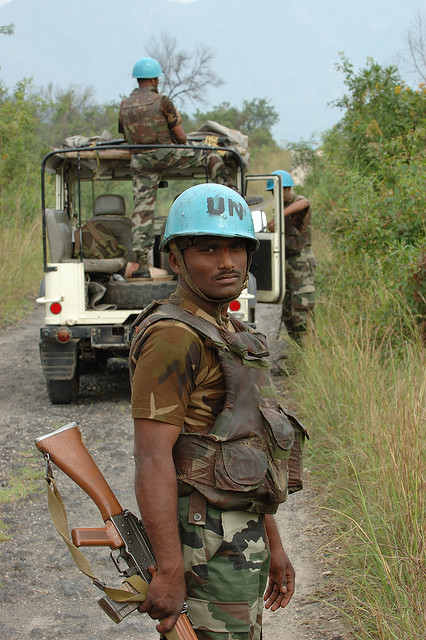Hey UN Peacekeepers--Congo, we need to talk
Vivek Nemana is a graduate student in economics at New York University and works for DRI.

Jeff Gettleman has an unnerving piece in the New York Times on the inability of UN peacekeeping forces to protect civilians in the Democratic Republic of Congo. In one particularly gruesome consequence last July, rebels gang-raped 242 people (including a one month-old baby and a 110 year-old woman, according to the Guardian) in the village of Luvungi, just 11 miles from where dozens of peacekeepers were stationed. Gettleman writes:
Despite more than 10 years of experience and billions of dollars, the peacekeeping force still seems to be failing at its most elemental task: protecting civilians…many critics contend that nowhere else in the world has the United Nations invested so much and accomplished so little.
On the other hand, David Bosco at Foreign Policy chalks it up to problems of perception:
part of peacekeeping's image problem is that it's asked to handle some of the world's worst conflicts and then given very little credit for moving situations from awful to merely bad.
And Jason Stearns writes in the CS Monitor that while the peacekeeping force may have been negligent, the main problem is corruption within the Congolese army:
So long as ... impunity within the army reigns, these kinds of abuses will continue to happen. Just look at all of officers recommended for sanctions in UN Group of Experts reports and various human rights documents. Almost none have been arrested.
These explanations gloss over a simple necessity that MONUSCO, and many previous failed PKOs and aid efforts, fundamentally lacked: a reliable system of communication. Despite $1.35 billion a year and 18,000 peacekeepers, correspondence between Congolese civilians, peacekeeping troops, and UN officials remains deficient. As Shakespeare could have told the UN, failures in communication between the parts lead to easily-preventable blunders which lead to tragedy.
For instance, Gettleman reports that because “there is no cellphone service in the area or electricity, it is not always simple to know when there is an attack. The United Nations…is now trying to install solar-powered high-frequency radios in some villages.”
Could someone please explain why, if there was no cellphone service or electricity, and peacekeepers had been operating in remote areas like Luvungi for 10 years, these radios weren’t installed before the UN embarrassed itself a little earlier?
But that’s not all. Marcel Stoessel, Oxfam’s country director in DRC, told Voice of America that many of the peacekeepers do not speak French, and do not have interpreters. That means that villagers often can’t inform peacekeepers about major threats or problems.
The Guardian wrote that MONUSCO insists it didn’t know about the attacks for more than a week, adding, “Two UN officials in Kinshasa told the Associated Press they heard it from media reports, even though the UN’s small civil affairs office in Walikale is charged with protecting civilians.”
In fact villagers did warn the peacekeepers about a coming attack, but their entreaties were lost in translation – the interpreter-less peacekeepers dismissed it as a false alarm.
While many things can complicate a peace-keeping operation, we shouldn’t excuse the UN for failing on something as simple as installing radios or hiring interpreters.
 From Aid to Equality
From Aid to Equality
